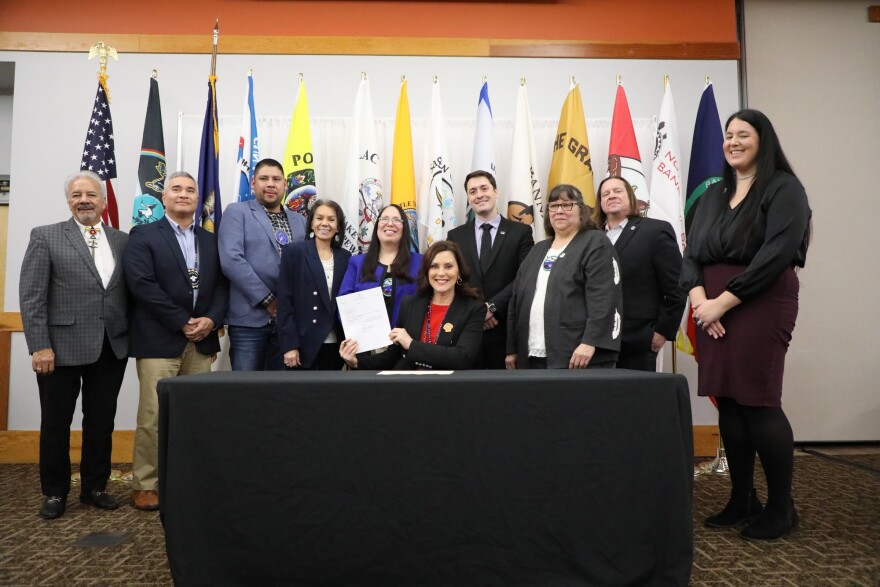On an early January morning, the Family Preservation Court at the Little Traverse Bay Bands of Odawa Indians courthouse in Petoskey is pretty quiet.
But in a room to the right of the entrance, a judge and attorneys are checking in with some families.
Social workers for each case are in the courtroom with the prosecutor and the attorneys that represent the families. Two parents are in person. Others attend remotely.
Chief Judge Allie Greenleaf Maldonado’s bench sits at the ground level — on equal footing with everyone in attendance. She talks to clients directly. She asks one parent about the pressures of drinking around the holidays and whether she has a plan for attending Alcoholics Anonymous meetings.
In another case, she asks a parent about her kid's report card and if they have everything they need like shoes for basketball. Social workers, attorneys and prosecutors each had a chance to speak. The courtroom even clapped for families that shared their successes since their last check-in.
This is part of a big change the tribe made recently to how it handles child welfare cases — an attempt to address what it calls a crisis across Michigan and the country.
'TELL ME SOMETHING POSITIVE YOU DID'
Court administrator Matthew Lesky said these kinds of interactions are unheard of at the state level.
“It’s really just kind of like, how was your week,” Lesky said. “Tell me something positive you did, tell me a challenge that you faced and how did you overcome that, do you have any needs that aren’t being met? And the next person gets up and they do that again.”
Lesky said this reframes the way that people interact in court. It’s a different approach to how families usually interact with courts. Supporters say it’s less adversarial than state courts.
Maldonado said weekly check-ins from the court and the biweekly hearings are more frequent than state courts and, she says, more in line with reality.
“And if you think about it, people's lives don’t unfold neatly in 90 days (or) six-month intervals,” she said. “I don’t think the court ever catches up.”
“The traditional way has always been we remove children and the goal is reunification. I always found that to be somewhat backwards, because it’s traumatizing to the children.” — Attorney Jennifer France
Maldonado, the tribe and attorneys have the same goal for the preservation court: keep families together and children out of foster homes.
“The traditional way has always been we remove children and the goal is reunification,” said Jennifer France, a parent’s attorney who has more than 20 years of experience between state and tribal courts. “I always found that to be somewhat backwards, because it’s traumatizing to the children.”
It’s why the tribe decided to rethink the child welfare program. About a year ago, they created the family preservation court.
Maldonado said it allows the court to wrap services around families at the front end before a situation gets worse.
“We assist with housing,” she said. “We assist with transportation. We help people that need education to get education. If people have barriers to employment, we address those barriers.”
Attorney Jon Steffy said the court can use these resources to help out the parents.
“And also to keep the kids supported,” Steffy said. “It’s really unique in my experience working in Michigan and Chicago, state courts, etcetera. I think it really serves the kids very well compared to other courts.”
KEEPING FAMILIES TOGETHER
When kids end up in foster care, it can yield some poor results.
National studies from the Annie E. Casey Foundation found that one in four children that age out of foster care will be in the justice system in some capacity within two years.
The National Foster Youth Institute found that only 50 percent of children in foster care will finish high school. A fifth of children who age out of foster care end up homeless.
The family preservation court is new for the tribe and its successes have yet to be measured. But people seem to be happy with the early results
And Maldonado believes this approach will prevent kids from being in foster care and keep them connected to their culture.
Kevin Gasco is a cultural resource advisor with the tribe and works with the families in the program.
“Our view as Anishinaabe people, life is a journey,” Gasco said. “Our journey involves walking a path. What we’re trying to do as cultural resource advisors is help them take those first steps on that path.”
But Gasco said that can be hard to do for people who feel disconnected from their culture.
“They don’t have culture bearers to pass those things down,” he said. “Identity is one of the keys to finding your place and finding what path you’re going to be walking as an individual."
Fellow advisor Miigwaans Smith said when she sees her clients working to discover their identity, she sees them healing through their traumas, "and looking within themselves to find the good and the light at the end of the tunnel,” she said.
"I think it’s very helpful, it helped me a lot and I hope it helps them, too."
So far they haven’t had to separate any families.
THE FUTURE
The tribe plans to revisit revisions to the child welfare statute. It’s been about a year and they plan to evaluate anything they need to fix or address.
Chief Judge Maldonado said it’s been an honor to watch people transform their lives.
“To know that you did something to help them,” she said. “That they put forward their hand and you reached back. And that’s probably what I’ll miss most.”
Even though Maldonado is moving to the state court of appeals, she’ll stay in Petoskey. She is eager to see where the program goes next. She wants to see the tribe introduce more data collection.

“They’re going to carry this on and they’re going to make it a success,” she said. And my dream is that the state of Michigan will look at it and see that success.”
She hopes they will replicate some of it in state courts.
The Michigan Department of Health and Human Services has partnered with the Little Traverse Bay Bands of Odawa Indians and recognizes the efforts of the family preservation court.
Maureen Clore is the director of Antrim, Charlevoix and Emmet counties for MDHHS. In a statement, Clore supported the work of the tribe's Family Preservation Court, and Maldonado's work to establish it.
“We have seen this model be very successful in supporting children and families and we look forward to continuing this work with the Little Traverse Bay Bands of Odawa Indians,” Clore said.
She said MDHHS has committed staff from child protective services, foster care and Native American Outreach workers to attend hearings through the court.
“So that families are receiving the best possible services through the collaboration of the state and tribe,” she said.


